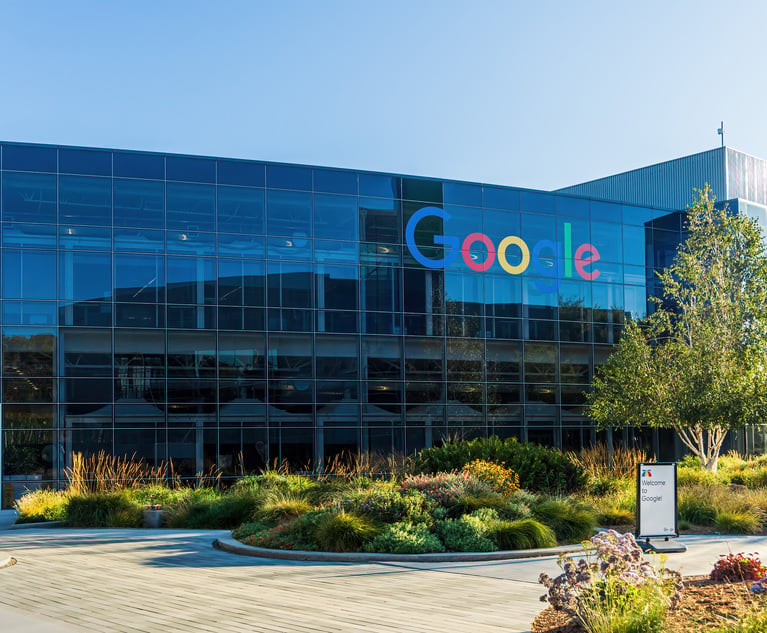We Are All Victims of Google's 'China Syndrome'
If you Google “What is the world's biggest private spying-services contractor?” the result should read: “Google.”
January 10, 2019 at 05:57 PM
5 minute read
 Gerald Sauer, Sauer & Wagner (Photo: Courtesy photo)
Gerald Sauer, Sauer & Wagner (Photo: Courtesy photo)
If you Google “What is the world's biggest private spying-services contractor?” the result should read: “Google.”
In November, Google employees published a letter of protest against Project Dragonfly, Google's search engine for the Chinese market, alleging that the tool would facilitate government censorship of and spying on citizens. “Providing the Chinese government with ready access to user data, as required by Chinese law, would make Google complicit in oppression and human rights abuses,” they wrote. “Many of us accepted employment at Google with the company's values in mind, including its previous position on Chinese censorship and surveillance, and an understanding that Google was a company willing to place its values above its profits.”
The sixth core value in Google's “Ten things we know to be true” is “You can make money without doing evil.” Google abandoned this value long before Dragonfly. In December, Google CEO Sundar Pichai was grilled by House Judiciary Committee members, many of whom were convinced that the search engine was a tool of left-wing radicals, others who questioned the company's privacy practices. “All of these topics—competition, censorship, bias and others—point to one fundamental question that demands the nation's attention,” said House Republican leader Kevin McCarthy. “Are America's technology companies serving as instruments of freedom or instruments of control?”
In hyper-partisan times, information is the weapon of choice. House Republicans charge that Google is engaging in censorship based on perceived favoritism toward anti-right content in web searches; the Dragonfly outrage encompasses not just censorship but also invasion of privacy and spying on China's citizens. The fundamental issue is whether Google is an open marketplace of information or a vehicle for censorship and spying.
Google's name is synonymous with Internet search: “If it's out there, you can find it on Google.” Its mission is “to organize the world's information and make it universally accessible and useful.” Before buying Google's claim that it places objectivity before profits, follow the money. Parent company Alphabet reported earnings of $110 billion in 2017, with ad revenue accounting for more than half. Businesses pay a lot to get top rankings, and users gravitate to top search results even when lower-placed organic results are more relevant. In a 2015 study participants prioritized the first page of search results and their order on the page even when researchers reversed the order of results. A 2016 study found that user clicks on paid advertising featuring Google's own services increased by more than half while clicks on organic search listings decreased by the same amount.
We should care how Google makes its money because the foundation of our political system is at stake. The “search engine manipulation effect” can change the outcome of national elections by more than 25 percent, with rankings masked so users aren't aware of the manipulation. No wonder North American companies spend more than $20 billion annually to place results at the top of rankings.
Given the life-or-death importance of placement, it's no surprise that Google settled for $22.5 million a class action lawsuit claiming that ads were relegated to search engine “no man's land”: “Google concealed from advertisers that it actually was placing substantial numbers of their ads on low quality parked domain and error pages that contained little or no content, and which could not be accessed through what Internet users considered to be search,” according to the complaint. In 2017 the European Union fined Google a record-breaking $2.7 billion, finding that the company manipulated search results to give an “illegal advantage” to its own services while harming rivals.
We don't need to go to China to find censorship. Google made its fortune through manipulation of search results, systematically stifling content by pushing it below the magic first page or moving it onto inaccessible pages. As to privacy, China may be the wakeup call but it isn't the culprit. Searching on Google is like being in a room with a portrait whose eyes follow you wherever you stand. They've figured out what you're doing, what you're thinking, and what you need to purchase. The information isn't likely to be used to persecute you, but incessant, targeted advertising could itself be considered a unique form of torture.
We are already victims of the China Syndrome. Instead of protesting censorship and spying in China, we should stop it in our own backyards. It's time for the United States, which follows a piecemeal approach to information protection, to join more than 80 countries worldwide in adopting comprehensive data privacy laws requiring that individual information be kept secret and be fairly and lawfully processed for limited purposes in accordance with individual rights.
Users deserve the right to opt out of controlled searches and the ability to view all available content. They should be told how their personal information may be used and empowered to place boundaries around its collection and use. Think of the amount of personal information that can be gleaned from your own Internet search history and how it could be used to target you. It should make you think twice before doing your next search.
Veteran civil trial attorney Gerald Sauer is a founding partner at Sauer & Wagner of Los Angeles. He specializes in intellectual property, employment, and business law.
This content has been archived. It is available through our partners, LexisNexis® and Bloomberg Law.
To view this content, please continue to their sites.
Not a Lexis Subscriber?
Subscribe Now
Not a Bloomberg Law Subscriber?
Subscribe Now
NOT FOR REPRINT
© 2025 ALM Global, LLC, All Rights Reserved. Request academic re-use from www.copyright.com. All other uses, submit a request to [email protected]. For more information visit Asset & Logo Licensing.
You Might Like
View All
How We Won: BraunHagey’s $56M Trademark Win Over Molson Coors Upheld by 9th Circuit
8 minute read
'Water Cooler Discussions': US Judge Questions DOJ Request in Google Search Case
3 minute read
Judge to Hear Arguments on Whether Google's Advertising Tech Constitutes a Monopoly
3 minute readTrending Stories
Who Got The Work
J. Brugh Lower of Gibbons has entered an appearance for industrial equipment supplier Devco Corporation in a pending trademark infringement lawsuit. The suit, accusing the defendant of selling knock-off Graco products, was filed Dec. 18 in New Jersey District Court by Rivkin Radler on behalf of Graco Inc. and Graco Minnesota. The case, assigned to U.S. District Judge Zahid N. Quraishi, is 3:24-cv-11294, Graco Inc. et al v. Devco Corporation.
Who Got The Work
Rebecca Maller-Stein and Kent A. Yalowitz of Arnold & Porter Kaye Scholer have entered their appearances for Hanaco Venture Capital and its executives, Lior Prosor and David Frankel, in a pending securities lawsuit. The action, filed on Dec. 24 in New York Southern District Court by Zell, Aron & Co. on behalf of Goldeneye Advisors, accuses the defendants of negligently and fraudulently managing the plaintiff's $1 million investment. The case, assigned to U.S. District Judge Vernon S. Broderick, is 1:24-cv-09918, Goldeneye Advisors, LLC v. Hanaco Venture Capital, Ltd. et al.
Who Got The Work
Attorneys from A&O Shearman has stepped in as defense counsel for Toronto-Dominion Bank and other defendants in a pending securities class action. The suit, filed Dec. 11 in New York Southern District Court by Bleichmar Fonti & Auld, accuses the defendants of concealing the bank's 'pervasive' deficiencies in regards to its compliance with the Bank Secrecy Act and the quality of its anti-money laundering controls. The case, assigned to U.S. District Judge Arun Subramanian, is 1:24-cv-09445, Gonzalez v. The Toronto-Dominion Bank et al.
Who Got The Work
Crown Castle International, a Pennsylvania company providing shared communications infrastructure, has turned to Luke D. Wolf of Gordon Rees Scully Mansukhani to fend off a pending breach-of-contract lawsuit. The court action, filed Nov. 25 in Michigan Eastern District Court by Hooper Hathaway PC on behalf of The Town Residences LLC, accuses Crown Castle of failing to transfer approximately $30,000 in utility payments from T-Mobile in breach of a roof-top lease and assignment agreement. The case, assigned to U.S. District Judge Susan K. Declercq, is 2:24-cv-13131, The Town Residences LLC v. T-Mobile US, Inc. et al.
Who Got The Work
Wilfred P. Coronato and Daniel M. Schwartz of McCarter & English have stepped in as defense counsel to Electrolux Home Products Inc. in a pending product liability lawsuit. The court action, filed Nov. 26 in New York Eastern District Court by Poulos Lopiccolo PC and Nagel Rice LLP on behalf of David Stern, alleges that the defendant's refrigerators’ drawers and shelving repeatedly break and fall apart within months after purchase. The case, assigned to U.S. District Judge Joan M. Azrack, is 2:24-cv-08204, Stern v. Electrolux Home Products, Inc.
Featured Firms
Law Offices of Gary Martin Hays & Associates, P.C.
(470) 294-1674
Law Offices of Mark E. Salomone
(857) 444-6468
Smith & Hassler
(713) 739-1250







